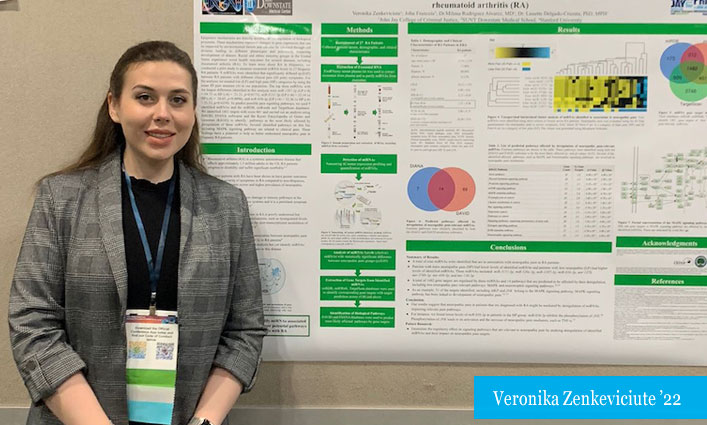
Our “Research on the Rise” series showcases impactful and noteworthy research by John Jay faculty, students, and alumni.
“I was exposed to the medical world at an early age,” says Veronika Zenkeviciute ’22. “My mother was a neonatologist, and one day, her colleagues let me look into a microscope and observe a blood sample from a premature baby with a serious condition,” recalls the cell and molecular biology major. “That’s when I knew I wanted to understand the causes behind diseases and help people through science.”
At John Jay, Zenkeviciute is researching rheumatoid arthritis with Professor Lissette Delgado-Cruzata, Ph.D. , and she presented their work at the SACNAS National Diversity in STEM conference, which earned Zenkeviciute the Outstanding Research Presentation Award. “Winning the Outstanding Research Presentation Award meant so much to me. It means more people will become aware of our research and how it can help in developing therapeutic treatments to alleviate symptoms for patients diagnosed with rheumatoid arthritis.” We chatted with Zenkeviciute to learn more about her research and plans for the future.
“I knew I wanted to understand the causes behind diseases and help people through science.” —Veronika Zenkeviciute ’22
Can you tell us about the research you’re doing at John Jay?
I joined my faculty mentor Dr. Delgado-Cruzata’s lab—she conducts research on racial and ethnic disparities in Rheumatoid Arthritis (RA)—where we’re studying microRNAs (miRNAs) in the serum samples of patients diagnosed with RA. We explored dysregulations of miRNAs associated with neuropathic pain and learned that some miRNAs are important in this process and could potentially be targeted to alleviate the burden of RA.
How does your research move the needle forward on justice?
Our group determined that only six percent of the research on RA is in Latinx patients. Yet, Latinx RA patients suffer most from chronic diseases like RA, and their symptom manifestation is usually more severe. Hopefully, our findings bring awareness of health disparities and lead to changes in the healthcare system, including creating better access to healthcare and more appropriate treatments for underrepresented populations.
How will your research help patients who have RA?
Patients with RA that experience neuropathic pain are often treated with disease-modifying antirheumatic drugs (DMARDs), but these drugs do not address the pain and this symptom is not adequately treated. This leads to a lower quality of life or even disability. Our findings show that there is a potential in using gene targeting therapies, that could alleviate neuropathic pain.
Where does your passion for research and enhancing public health for underrepresented communities come from?
After immigrating from Lithuania to the United States in 2014, I was exposed to people from different parts of the world for the very first time and quickly learned that disparities existed in this country. As a result, during my undergraduate studies at John Jay, I decided to focus on the cellular and molecular mechanisms behind diseases and understanding health disparities.

“When I discovered Dr. Delgado-Cruzata’s work on rheumatoid arthritis and how her research raises awareness on racial health disparities, I knew I wanted to be part of it. Joining her lab was one of the most significant events for me at John Jay.” — Veronika Zenkeviciute ’22
How did Professor Delgado-Cruzata help you with your research?
When I discovered Dr. Delgado-Cruzata’s work on rheumatoid arthritis and how her research raises awareness of racial health disparities, I knew I wanted to be part of it. Joining her lab was one of the most significant events for me at John Jay. She continuously supports and guides me through my work, allowing me to discover my strengths and improve my weaknesses. She also played a big part in my receiving this award. Not only has she guided me throughout the research process, she was also the person at John Jay College that I could always lean on when things got difficult.
Where do you see yourself in 10 years?
My goal is to continue my education, earn a Ph.D., and eventually find necessary therapeutic treatments for chronic diseases. I plan to be a strong advocate for underrepresented populations and continue researching health disparities. It’s a big issue in our society and one I hope to improve.



